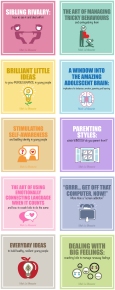Chapter One: The Challenge of Parenting Tough Kids
What is on offer for your children at home?For most parenting is solid work, but the hard work is compensated by the joy we're drip-fed as our children emerge successfully into the world. But for some, the struggle with one of their children, or all of them, is to such a point that they measure their family's cohesion in minutes rather than years. So why is it that some parents seem to raise their children successfully with little worry, and their children turn out well enough?
To begin with, parenting skills are hugely deceptive. It's more, much more, than just knowing what to do. There's such a fine line separating parents who know the answers, compared to those who know the answers, but don't seem to be able to put the skills into place when under pressure. When under pressure most admit to falling headlong into the obvious parenting pitfalls, even though they know all about them. Most blame their runaway emotion which is driven by their deep love for their children. So often parents know they teeter between expecting too much or too little. Or, they find themselves interfering with their child's decisions with too much helpful advice. They do this because they hope it will help their child find a sense of responsibility, or it may help them meet expectations, or improve family harmony, their friendships or their school grades. Eventually, most parents discover the elusive balance needed. They discover that they don't have to have all the answers because the harder they work at finding them for their children the more they're likely to limit their children's independent emergence into the world. All children need to engage with the world, experience problems, feel discomfort, find solutions and experience the good and not so good outcomes in order to develop a robust set of emotional resources.
Poor parenting methods and family tensions can contribute to difficulties, but they're not the only cause. Many children just learn the hard way, or in a different way, so a thoughtful, consistent approach at home truly makes a difference. The difficulty is more often in the nature or style of these children. They often experience problems with memory, persistence, emotion or organisation, and each of these can impact heavily on their day-to-day functioning. Parents really need to know this. In particular, the early teenage years can be a period of powerful control struggles. Developmentally, we expect our children to fl ex their teen spirit
At whatever level of difficulty these issues exist tackling them can be overwhelming. The good news is that it's not a matter of unearthing a miraculous cure. Start at the core and begin by looking at yourself, your child's temperament, your family and weigh up what's really on offer at home. Let's start.
What is happening with you?
What do you see when you look at your child?
There is a belief that good intervention should work, and work fast. Just like a headache cure! So, when sensible behavioural interventions don't give a fast result, the assumption often is that the intervention won't work. It's more effective to accept the truth; that is, progress is slower for some children, especially those with learning difficulties, emotional problems and developmental delay. It is the simple, daily things we do that will make the greatest difference to our children's development and happiness.
Without this clear-headed awareness, it's all too common to see parents jump on board the professional merry-go-round. First, a diagnosis is sought for their child from a psychologist or health care professional. This sensible beginning sharpens understandings about the difficulty, available interventions and can provide refinement of wise management. Then, seemingly harmless visits to an abundance of counsellors, master coaches, special learning centres, achievement centres, boost centres, occupational therapists, social skills trainers, sound therapists, kinesiologists, speech pathologists, neurofeedback practitioners, educational tutors, success centres, physiotherapists, chiropractors, naturopaths, dieticians, hypnotists, acupuncturists and other "experts" intensifies the quest to find the cure.
In these situations it is the child who loses out.
All book purchases include a one off $20 postage and handling fee per purchase












